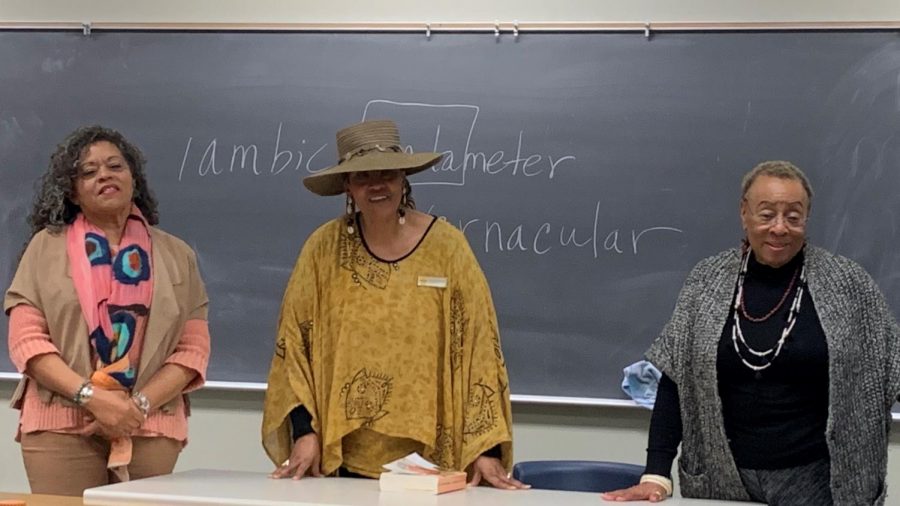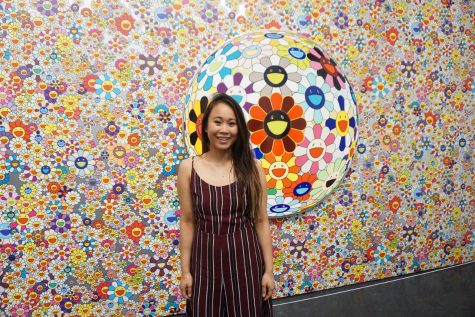In celebration of Women’s History Month, San Diego Mesa College hosted an uplifting and empowering poetry reading by renowned local black women poets on March 11. The event, entitled “From Where I Stand,” invited Dr. Judy Sundayo, Rev. Alyce Smith Cooper, and Dr. JoAnne Cornwell to read from their very own poetic works. The presented poems were carefully selected to honor the theme of “Women Rising” for Women’s History Month. The reading took place in the classroom of professor Theresa Ford of the Black Studies department, who was able to fondly introduce each poet, having known them personally for many years.
To begin the poetry reading, black studies professor Thekima Mayasa first described the true importance of storytelling. She said, “The first form of education is through storytelling, and it is the most enduring. Storytelling is, as a tradition, what grounds people … especially when they’re in an environment that is oppressive. And it also liberates them, and emancipates them, and it empowers them to know that they can do more. So I just wanted to remind that storytelling isn’t just a fairytale, it’s a very serious tradition in the African tradition.”
On that powerful note, Sundayo, Chair of the Committee for Diversity Action, Inclusion & Equity, rose to the podium. The first poem she selected to share was in honor of the late Maya Angelou, who she saw not only as someone she aspired to be, but as a wisdom weaver as well. There was a pause before she began, and the room came to a complete silence. Sundayo eloquently recited her beautiful poem as the audience hung on her every word.
Sundayo directly addressed Angelou in her poem, “Miss Maya, you were the woman weaving wisdom with a phenomenal flair. And in a language our hearts recognized, you were the woman weaving the words that would shelter us from ignorance,” she read.
“No matter they wove cages for us; You wove the key. And now for you, we sing new songs celebrating hope, and brotherhood, and compassion, and all the possibilities of freedom.” Sundayo continued, praising Angelou for all she has done for black women, “And what you’ve woven is so stunning, so strikingly beautiful to the mind’s eyes. Though gone from view, Miss Maya, in our hearts, still, and always, will you rise.”
The room filled with applause and faces in the audience were beaming. Then, it was Rev. Cooper’s turn, as she continued to inspire the audience with a piece dedicated to Grandmother Africa. She performed her poem with a bold energy that showcased her colorful personality. She declared, “Together we stand, forward we move.” Her moving performance excited the listeners who were clapping and nodding with satisfaction.
Afterwards, the audience enjoyed a poem by Cornwell, professor emerita of San Diego State University, that was more playful and flirtatious. Cornwell told the crowd, “From where I stand … It’s all about love.” Her poem depicted themes of sisterhood, love, and attraction and it was so personal that she made you believe that she was speaking to you as one of her best friends. Laughter filled the room as everyone listened to with amusement.
Before the second round of readings, Mayasa briefly interrupted to emphasize how special this day was to have the three poets gathered here together. “The caliber of people that you have before you is something that many people never get to experience at all,” she said. “All of these women … can hold any place, anywhere, at any time, and to have them all in one place, together, is something that very rarely happens in an educational experience.” The audience was smiling and nodding in agreement, appreciative to be given the rare opportunity.
The poetry reading continued as Sundayo, Cooper, and Cornwell read more of their poems. In Sundayo’s next empowering poem, she spoke of many influential black women such as Oprah, Ella Fitzgerald, Aretha Franklin, and Condoleezza Rice. Sundayo announced to the crowd, “As black women, we can do anything!” One woman from the crowd confidently replied, “Okay! That’s right.” The rest of the crowd cheered along, grins wide across their faces. Sundayo then expressed that we need to “realize that our stage has been set for success.”
The following poems gave reverence to our Mother Earth and discussed generational inventory and the importance of each and every person. The final poem, recited by Cornwell, taught us to embrace beauty and “to expand our notions of what’s feminine, attractive, dynamic, interesting, and important.”
At the end, an audience member asked the poets what their advice was to aspiring poets or people still unaware of their poetic capabilities. They explained that writing poetry is a very enriching and expanding experience. They encouraged the audience not be afraid of it and to just run with it, because it’s a self-realizing and self-healing process.
“Don’t disqualify or in any way denigrate your thoughts that come to you,” said Cooper. “Your intuition is the progenitor for everything that you will ever do. And so if your thoughts are giving you these words, honor them. Honor them because they are to be honored. What you think and what you believe is honorable. Take note, take it down.”


